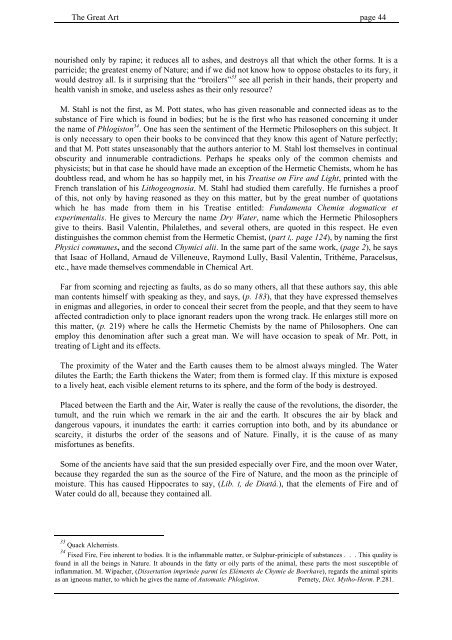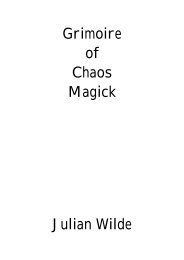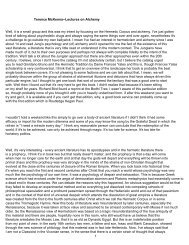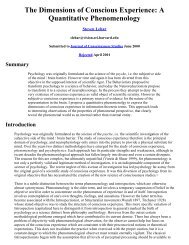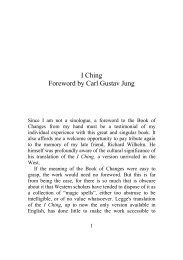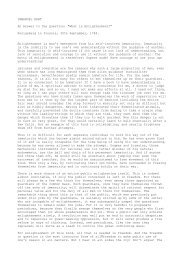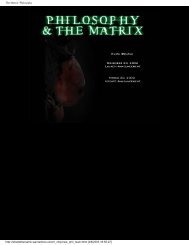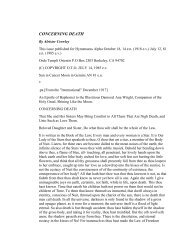Pernety - A Treatise On The Great Art.pdf - cyjack.com
Pernety - A Treatise On The Great Art.pdf - cyjack.com
Pernety - A Treatise On The Great Art.pdf - cyjack.com
Create successful ePaper yourself
Turn your PDF publications into a flip-book with our unique Google optimized e-Paper software.
<strong>The</strong> <strong>Great</strong> <strong>Art</strong> page 44nourished only by rapine; it reduces all to ashes, and destroys all that which the other forms. It is aparricide; the greatest enemy of Nature; and if we did not know how to oppose obstacles to its fury, itwould destroy all. Is it surprising that the “broilers” 33 see all perish in their hands, their property andhealth vanish in smoke, and useless ashes as their only resource?M. Stahl is not the first, as M. Pott states, who has given reasonable and connected ideas as to thesubstance of Fire which is found in bodies; but he is the first who has reasoned concerning it underthe name of Phlogiston 34 . <strong>On</strong>e has seen the sentiment of the Hermetic Philosophers on this subject. Itis only necessary to open their books to be convinced that they know this agent of Nature perfectly;and that M. Pott states unseasonably that the authors anterior to M. Stahl lost themselves in continualobscurity and innumerable contradictions. Perhaps he speaks only of the <strong>com</strong>mon chemists andphysicists; but in that case he should have made an exception of the Hermetic Chemists, whom he hasdoubtless read, and whom he has so happily met, in his <strong>Treatise</strong> on Fire and Light, printed with theFrench translation of his Lithogeognosia. M. Stahl had studied them carefully. He furnishes a proofof this, not only by having reasoned as they on this matter, but by the great number of quotationswhich he has made from them in his <strong>Treatise</strong> entitled: Fundamenta Chemiœ dogmaticœ etexperimentalis. He gives to Mercury the name Dry Water, name which the Hermetic Philosophersgive to theirs. Basil Valentin, Philalethes, and several others, are quoted in this respect. He evendistinguishes the <strong>com</strong>mon chemist from the Hermetic Chemist, (part I,. page 124), by naming the firstPhysici <strong>com</strong>munes, and the second Chymici alii. In the same part of the same work, (page 2), he saysthat Isaac of Holland, Arnaud de Villeneuve, Raymond Lully, Basil Valentin, Trithéme, Paracelsus,etc., have made themselves <strong>com</strong>mendable in Chemical <strong>Art</strong>.Far from scorning and rejecting as faults, as do so many others, all that these authors say, this ableman contents himself with speaking as they, and says, (p. 183), that they have expressed themselvesin enigmas and allegories, in order to conceal their secret from the people, and that they seem to haveaffected contradiction only to place ignorant readers upon the wrong track. He enlarges still more onthis matter, (p. 219) where he calls the Hermetic Chemists by the name of Philosophers. <strong>On</strong>e canemploy this denomination after such a great man. We will have occasion to speak of Mr. Pott, intreating of Light and its effects.<strong>The</strong> proximity of the Water and the Earth causes them to be almost always mingled. <strong>The</strong> Waterdilutes the Earth; the Earth thickens the Water; from them is formed clay. If this mixture is exposedto a lively heat, each visible element returns to its sphere, and the form of the body is destroyed.Placed between the Earth and the Air, Water is really the cause of the revolutions, the disorder, thetumult, and the ruin which we remark in the air and the earth. It obscures the air by black anddangerous vapours, it inundates the earth: it carries corruption into both, and by its abundance orscarcity, it disturbs the order of the seasons and of Nature. Finally, it is the cause of as manymisfortunes as benefits.Some of the ancients have said that the sun presided especially over Fire, and the moon over Water,because they regarded the sun as the source of the Fire of Nature, and the moon as the principle ofmoisture. This has caused Hippocrates to say, (Lib. I, de Diœtâ.), that the elements of Fire and ofWater could do all, because they contained all.33 Quack Alchemists.34 Fixed Fire, Fire inherent to bodies. It is the inflammable matter, or Sulphur-priniciple of substances . . . This quality isfound in all the beings in Nature. It abounds in the fatty or oily parts of the animal, these parts the most susceptible ofinflammation. M. Wipacher, (Dissertation imprimée parmi les Eléments de Chymie de Boerhave), regards the animal spiritsas an igneous matter, to which he gives the name of Automatic Phlogiston.<strong>Pernety</strong>, Dict. Mytho-Herm. P.281.


